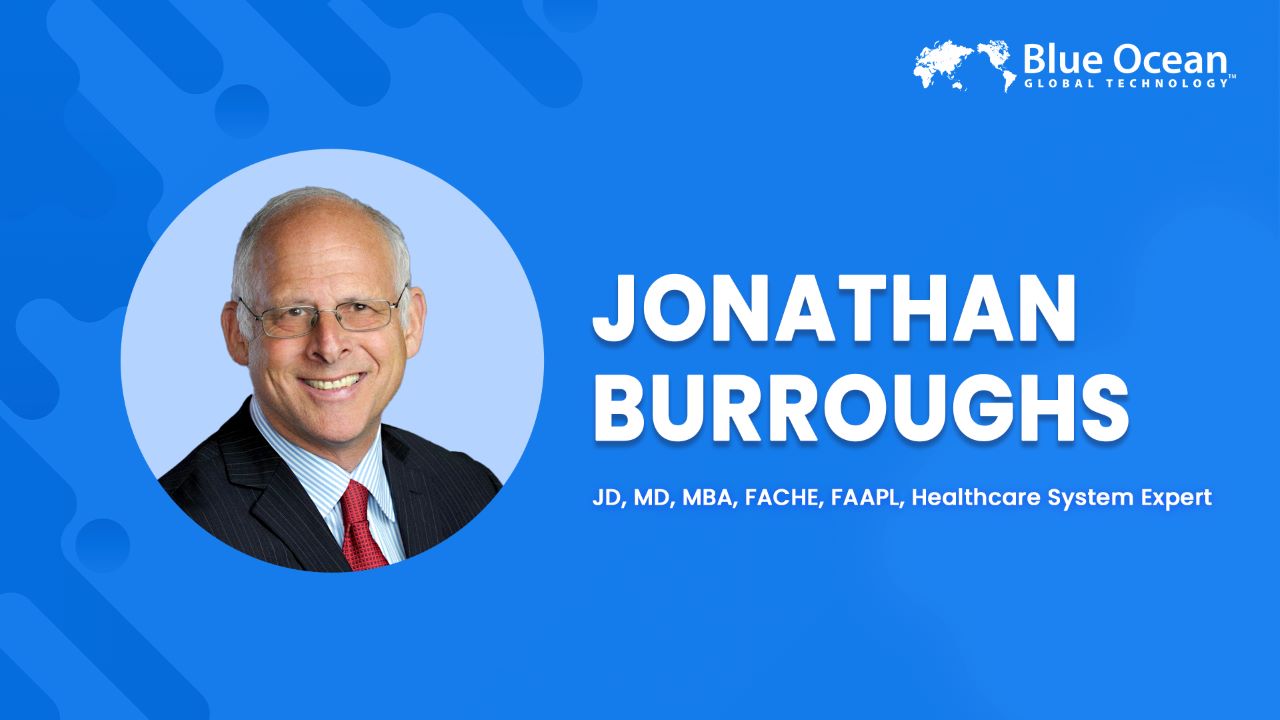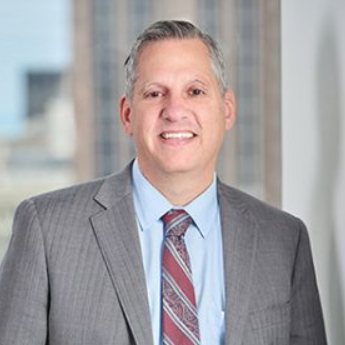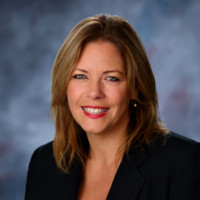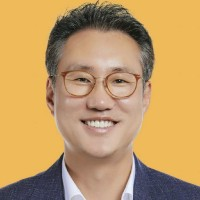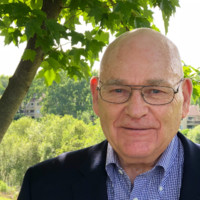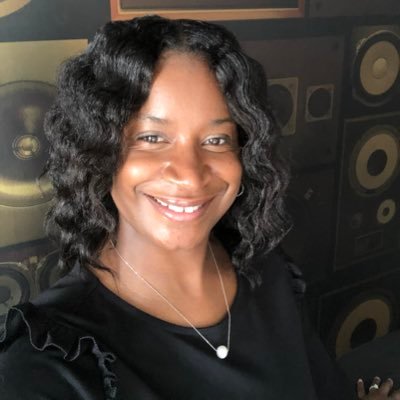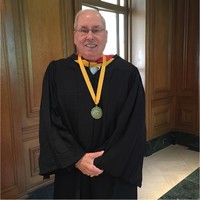About Jonathan Burroughs
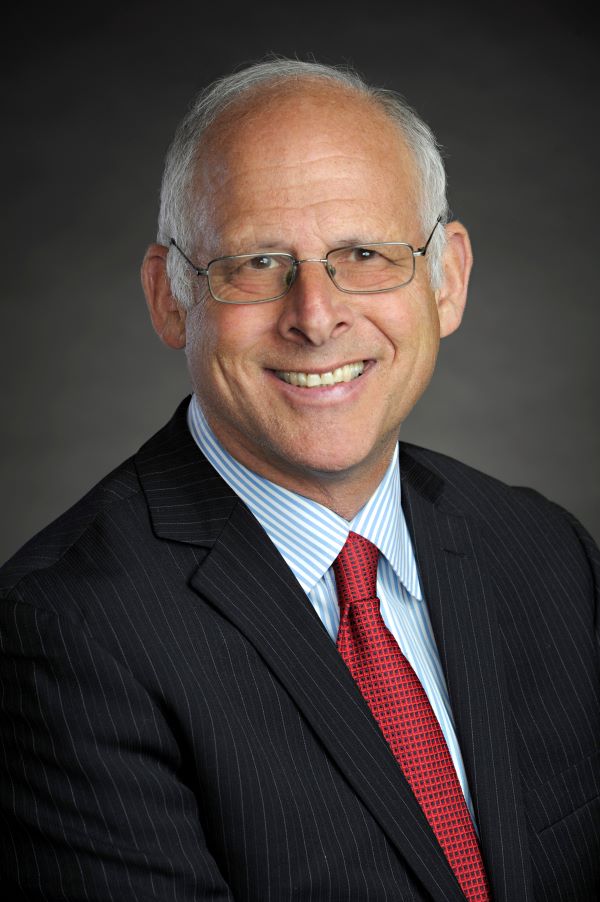
Dr. Jon Burroughs is embarking upon his sixth professional career, having been a professional pianist, mountain climbing guide/hiking guide author, emergency physician, healthcare administrator and governing board member, healthcare administrative expert and consultant, and now a healthcare attorney. He is a healthcare system expert and has participated in over 265 legal cases, written six healthcare administrative books (two of which were given James A. Hamilton national awards by the American College of Healthcare Executives), and serves on the national faculties of the American College of Healthcare Administration, the American Association for Physician Leadership, and the National Association Medical Staff Services. His goal is to help make healthcare a little safer.
Blue Ocean: Tell us about your professional journey. What inspired you to pursue this career, and what continues to fuel your passion for the profession today?
Jonathan Burroughs: This is my sixth career, and that in itself is the message: your path will likely evolve over time, and each step often leads naturally to the next. I began as a professional pianist, then became a mountaineer and guide, authoring several climbing guidebooks along the way. My interest in direct, hands-on impact led me to emergency medicine. I became an emergency physician and helped to introduce defibrillation in the 1980s. Over time, I became more focused on the broader systems behind care, which drew me into healthcare administration, teaching, and writing on the subject matter. That role eventually led me to law school in my seventies. Today, I’m a licensed healthcare attorney and systems expert, focusing on how healthcare structures either prevent or contribute to harm.
What inspired each transition was a mix of curiosity, purpose, and the desire to solve problems in more meaningful ways. Today, I focus on diagnosing healthcare systems—identifying what works, what doesn’t, and why harm happens or is prevented. I work with legal teams on both sides to pursue accountability and justice in healthcare. What continues to fuel me is the belief that improving systems can save lives, prevent suffering, and create lasting change far beyond what one person can do alone.
Blue Ocean: What does a typical day look like for you?
Jonathan Burroughs: A typical day for me starts outdoors. I live in the mountains of New Hampshire, so most mornings I hike, bike, ski, swim, or just take a walk. Doing something physical to stay grounded and energized. After lunch, I settle into work and usually continue through the afternoon and evening. My schedule doesn’t follow the traditional Monday-to-Friday, 9-to-5 rhythm. I don’t have weekends anymore, just days I work and days I play, often both in one.
One of the benefits of this stage in my career is the freedom to shape my days around what matters most. I don’t have to clock in or conform to anyone else’s hours, which lets me be more present, responsive to the weather, and turned in to my partner and personal priorities. I’ve worked toward this flexible, intentional, and deeply satisfying lifestyle.
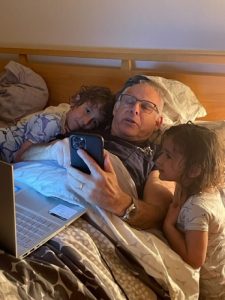
Blue Ocean: Which emerging trends in your profession most excite you?
Jonathan Burroughs: One of the most exciting and concerning trends in my profession is the rise of artificial intelligence and automation. We are seeing a major shift where many service jobs, including roles in healthcare and law, are being augmented or replaced by AI-driven tools and robotics. On one hand, this is an opportunity to streamline repetitive tasks, reduce human error in certain areas, and free professionals to focus on more complex, creative work. But it also poses a serious threat to jobs, human connection, and the integrity of professional judgment.
What worries me is the potential overreliance on AI, especially when it’s used to make decisions or produce documents without proper oversight. In law, for example, we’re already seeing cases where attorneys submit AI-generated briefs that contain factual errors or entirely made-up citations. This is what you call “hallucinations” in AI. The consequences of that are real. While this technology holds great promise, we need to approach it with caution and humility. We must make sure it enhances rather than replaces the human judgment, relationships, and ethics that professions like law and healthcare are built on.
Blue Ocean: Can you walk us through a particularly challenging case you’ve handled and explain your strategy for resolving it?
Jonathan Burroughs: Every case I handle presents its challenge because it requires dissecting a complex system rather than evaluating a single person or event. Often, you can reasonably argue both that the system did its best under difficult circumstances and that it failed in critical ways. That tension is what makes the work so intellectually engaging.
One strategy I use is identifying what we call in law school the “good facts” and “bad facts” on both sides. No case is one-sided. There are always elements that strengthen your argument and others that weaken it. I make it a point to fully understand the opposing perspective so I can anticipate counterarguments and craft a more resilient, balanced case. The goal is not just to argue a side, but to arrive at a deeper understanding of how the system operated, where it broke down, and what lessons we take from it.
Blue Ocean: How do you and your team continue to stay ahead in the highly competitive industry?
Jonathan Burroughs: Staying ahead of the curve requires constant adaptation. I often refer to General Shinseki’s quote: “If you don’t like change, you’re going to like irrelevance even less.” That mindset is central to how my team and I work. We focus on learning, unlearning, and relearning quickly. What you know and trust today may not hold tomorrow. So we prioritize intellectual flexibility and critical thinking. It’s not clinging to what’s familiar but staying curious, questioning assumptions, and being willing to evolve.
This adaptability extends to how we build relationships as well, define our purpose, and approach our roles. There was a time when you could master one skill and rely on it for decades. That’s not possible anymore. We encourage one another to keep updating our methods, perspectives, and tools. It takes a lot of openness, agility, and effort. Not everyone is naturally wired for it, but it’s essential if you want to stay effective and relevant in a world that’s changing faster than ever.
Blue Ocean: Is there any particular strategy or practice that you employ to make sure that you are adapting and unlearning?
Jonathan Burroughs: I rely on what the Greeks called tabula rasa, a blank slate. That means being willing to clear the board and let go of everything I think I know about a relationship, a profession, or a problem. I ask myself: “If I were seeing this for the first time, how would I understand it?” This helps me break out of old patterns and uncover insights I might have missed if I were just relying on experience.
It’s also a conscious effort to avoid anchor bias or the tendency to cling to information or beliefs that once served you but may no longer be valid. When you’re stuck in what used to be true, you risk what is true now. So, I make it a habit to question my assumptions and stay open to new interpretations. That rewiring isn’t easy, but it’s essential if you want to keep learning, growing, and responding effectively to change.
Blue Ocean: What core values or principles do you believe every great professional should uphold, regardless of their practice area?
Jonathan Burroughs: Uphold the truth. Not just personal truth, but an honest understanding of facts, context, and complexity. I often describe it as “calling balls and strikes.” In any field, you’re operating within a political environment where relationships matter and dynamics can influence outcomes. That means it’s not just knowing the truth; it’s knowing how and when to communicate that truth.
You need the discipline to pause and ask: “How do I express this in a way others can hear?” That’s a skill that enables you to translate the truth into language that’s strategic, respectful, and well-timed. Some people are naturally skilled at this kind of political navigation. I’m not one of them, which is part of why I’ve shaped a career that allows more independence. But for those working within organizations, the ability to communicate truth with tact and clarity is essential.
Blue Ocean: What are some common misconceptions people have about your field of work?
Jonathan Burroughs: A common misconception about my work is that it’s purely critical or adversarial. While many appreciate the intent behind what I do, there’s often discomfort when that truth challenges vested interests. I raise concerns and issue warnings about risks that can impact patients, providers, or the public, and that can feel threatening to organizations, corporations, or individuals who have a lot at stake in maintaining the status quo.
People are sometimes ambivalent. They don’t necessarily discount the facts I present, but they’re uneasy with the implications. No one likes having their “cage rattled,” especially when it comes to institutions they’ve built or invested in. But that tension has always existed for those who speak up about uncomfortable truths. It’s part of the work and part of what makes it necessary.
Blue Ocean: What distinct values do you bring to your clients, especially when managing complex or high-stakes situations?
Jonathan Burroughs: In complex or high-stakes situations, I bring to clients an unwavering focus on patient safety. Healthcare today is more complicated than ever, and with increasing private and equity investment, there is mounting pressure to prioritize profit. While profit itself is not the problem, it becomes a serious issue when it takes precedence over the well-being of patients. My role is to call attention to that line and ensure it’s not crossed.
What I offer is a clear, informed perspective that centers on human life. I help courts, legal teams, and organizations understand when systems failed, why they failed, and what the consequences were. In doing so, I advocate justice in individual cases and broader accountability in how health care is delivered. That commitment to protecting people is what drives my work and defines the value I bring.
Blue Ocean: How do you maintain emotional and psychological resilience when handling sensitive or high-pressure cases?
Jonathan Burroughs: I maintain emotional and psychological resilience by staying deeply connected to what replenishes me. I live in the mountains, and I spend time there every day. That rhythm of daily movement and immersion in nature is what grounds me. I work in some form, seven days a week, and I also spend seven days a week outdoors. That balance is what allows me to handle the intensity and emotional weight of my work.
You can’t give constantly without also refilling yourself. Everyone has a different source of renewal, like music, time with family, reading, or exercise, but you need to know what yours is. If you ignore that, the work will eventually drain you, and burnout will follow. True resilience comes from living with a sense of balance and harmony, on your terms. Discover what keeps you steady and make space for it every day.
Blue Ocean: What hobbies or interests do you enjoy outside of work?
Jonathan Burroughs: I was a professional mountain climber in my younger years and had the privilege of climbing peaks all over the world. For me, the mountains are a spiritual space. Being in nature gave me a deep sense of peace and connection to earth, my ancestors, to the future, and the cosmos.
While I may not climb at the level I once did, I still hike, swim, ski, and spend time outside every day. That connection to the natural world is what grounds me and sustains everything else I do. Alongside that, my marriage has been a steady source of strength. Sharing life with my wife has been one of the greatest joys and stabilizing forces in my journey. These keep me anchored, focused, and energized.
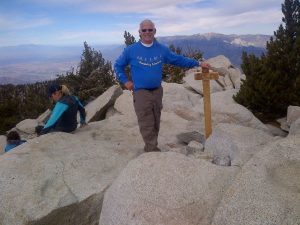
Blue Ocean: What advice would you offer to aspiring professionals entering the profession today?
Jonathan Burroughs: I always tell young people: “Find your passions!” If you do something just because it’s expected by your family, society, or even your younger self, it won’t sustain you. You will go through the motions, and that’s not how meaningful work gets done. The most effective and fulfilling careers are built when your heart is in it. Be honest with yourself about what truly drives you emotionally and spiritually.
Know yourself well enough to recognize when something is not working. It takes courage to change course, but that’s often where growth and fulfillment begin. Whether you are in law, healthcare, or any other field, there are countless paths you can take. Your job is not to meet someone else’s expectations but to find the path that feels alive to you. If you find yourself at a dead end, you’re on the wrong track. Permit yourself to pivot. Listen to what energizes you, and trust that it will lead you to the work you’re meant to do.
Blue Ocean: Is there a guiding principle, philosophy, or quote that has significantly influenced your career and life?
Jonathan Burroughs: Be honest–with yourself above all. This value took root early. I became independent as a child out of necessity, growing up in a household where I had to take responsibility for my happiness and fulfillment. Because of that, I learned early on to turn inward for mentorship. I’ve always followed my own sense of direction, and that’s what led me where I needed to go.
When you follow someone else’s path, you risk living someone else’s life. I’ve always believed in owning my choices fully, even when they didn’t fit conventional expectations. I chose music and mountains over money and status because happiness meant more to me than security or fame. Knowing what truly matters to you is something many people postpone or avoid. But I’ve found that when you commit to your path, even if it’s unconventional, you live with far fewer regrets. You become your own mentor.
Conclusion
Jon’s path toward embracing his true vocation has been marked by courage and determination. Throughout his life, he has pursued his passions and dreams with intention and authenticity, while consistently striving for excellence in every role he has undertaken. This dedication has shaped a purposeful and fulfilling life. His ability to align personal fulfillment with professional achievement reflects a deep sense of purpose and offers a powerful and inspiring example of adaptability and values-driven leadership.
Do you have a personal or professional story that can inspire other people into becoming the best version of themselves?
You are welcome to share your journey with our audience.

